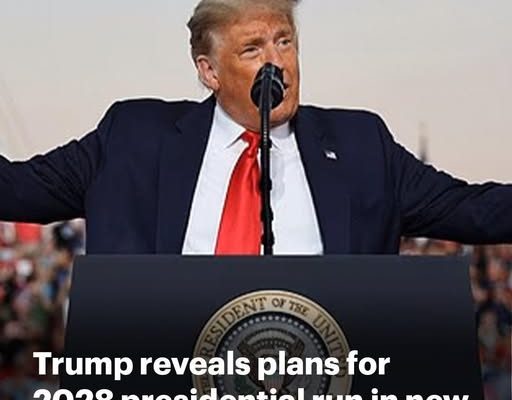President Donald Trump occasionally speaks more freely than even his closest advisers would like, usually right before sunrise. No teleprompter. No political script with precise weights. All you need is instinct, impulse, and that old showman’s talent for leaving the impossible hanging in front of a crowd long enough for them to fantasize about it.
It was one of those mornings when Trump chose to reveal his most recent headline while seated across from the CNBC hosts and beaming with confidence over what he claimed were historic economic victories. It has nothing to do with tariffs. Not the border. However, the question is whether four years in office will be sufficient for a man who maintains that he is only “getting started.”
“Unless I Run Once More.”
The remarks were made on Tuesday during a comprehensive business interview on Squawk Box, in which Trump boasted of factory openings, market record-breaking results, and, according to him, the “highest vote ever recorded in Texas.” “Such a record might just last forever,” he said with a sly smile. He teased, letting the words linger in the studio atmosphere, “unless I run again.”
Seeing an opportunity, co-host Becky Quick leaned in.
“Will you run once more?”
The president laughed. “No, probably not.”
That denial sounded casual, almost contemptuous, but then the Trump rhythm returned. “I want to run,” he said hastily. “My polling numbers are the best they’ve ever been. People adore the trade agreements, the tariffs, and the fact that other nations aren’t taking advantage of us.
The interview abruptly veered back into Trump’s preferred political theater of speculation, abandoning the realm of economic talking points. What if a two-term president, who is constitutionally prohibited from holding office again, just refused to step down? What would happen if the largest political entertainer in America refused to get off the stage?
The Facts He Must Face
Presidents are limited to two terms in office by the 22nd Amendment to the U.S. Constitution, which was ratified in 1951 following Franklin D. Roosevelt’s historic four-term run. Grover Cleveland, the only president to serve non-consecutive terms, would not have been able to run for president again after his second term because that cap applies regardless of whether those terms are consecutive or broken up.
Nevertheless, Trump has persisted in nodding, winking, and half-joking his way around the prospect of a 2028 run, leaving both supporters and detractors to question whether he is being serious or merely stirring things up.
“I won the popular vote by millions, and I won every swing state.” During the CNBC segment, Trump said, “My poll numbers are better now, much better than during the election.” He dismissed polling averages, which currently put his approval rating in the high-30s to low-40s, as “fake news media jokes.”
When asked directly if his poor rating would hurt his chances of winning again, Trump sneered, “That’s media polls.” The situation is different on the ground.
The Fixation on Loopholes
There is some truth to the media’s fascination with Trump’s potential to remain in power past 2029. Trump has frequently stoked those flames, especially when addressing his most loyal supporters, who applaud when he mentions serving “12 years” rather than eight.
Since late 2024, he has jokingly suggested a “third term” at rallies maybe six times. The rumors went from the fringe to the mainstream last spring when red baseball caps bearing the words “Trump 2028” started to circulate online. These caps were sold by independent Trump-branded merchandise stores rather than by his official campaign.
In May, Kristen Welker of NBC confronted him regarding the hats. Trump leaned into the rumors rather than dismissing them.
Trump remarked, “I will say this—so many people want me to do it.” “This is the strongest request I have ever received.”
He then admitted, “To the best of my knowledge, you’re not allowed to do it,” in the very next sentence. Nevertheless, “someone is selling the 2028 hat.”
Trump has made that combination of temptation and denial his signature tactic. So has bringing up the possibility that he might manage to get around it.
In March, he told NBC, “There are methods.” It is said that there are ways to do it. I’m not aware of that. However, some people are discussing it.
How could that possibly work?
One widely accepted theory among constitutional bloggers and right-wing legal hobbyists is:
Theoretically, Trump might run for vice president in 2028, backed by a devoted supporter such as Secretary of State Marco Rubio or Vice President JD Vance.Trump would retake the presidency under the Presidential Succession Act if that ticket were to win and the incumbent were to step down or resign.
That seems to get around the prohibition on direct elections while still granting him authority.
It is highly doubtful whether that would withstand Supreme Court scrutiny, but in the realm of Trump’s political circus, the concept is half the power. Beyond 2028, it keeps the focus squarely on him, where he seems to enjoy it most, while electrifying his supporters and infuriating his detractors.
Vance, Rubio, and the Heir Apparent Question in the “Successor” Talk
Trump has recently made an effort to quell constitutional rumors by stating that he only has “four great years” in mind at the moment and that he intends to hand the MAGA torch over to a loyal Republican successor.
“I would like it to be carried forward by a great Republican,” he told CNBC.
He most frequently waves the following heir-apparent names:
The author of Hillbilly Elegy, Vice President JD Vance, was once anti-Trump but eventually became Trump’s most adamant ideological spokesman.
Former Florida senator Marco Rubio, who Trump once derided as “Lil’ Marco,” is now resurrected as a hawkish supporter of foreign policy.
Both men are often mentioned in gossip. It is difficult to imagine Trump actually ceding control, even to his own selected protégé, given his smile whenever the succession issue is raised.
Indeed, Trump does not want a successor, according to a longtime Republican insider who spoke to Politico. He desires a continuation.A President Who Is Fixated on the Polls, Even When They Don’t Support Him
One of the most notable differences in Trump’s recent barrage of 2028 statements is his insistence that he has never been stronger politically, despite poll after poll showing a decline in public support.
According to this week’s Reuters/Ipsos poll, Trump’s approval rating is 40%, which is the lowest it has been during his second term.
He is currently at 37% in a Gallup poll, which warns of growing weariness even among men, who were once thought to be his core support base.
53% of men now disapprove of Trump’s job performance, according to a CBS/YouGov poll. Majorities believe he spends too much time on immigration crackdowns and not enough time on addressing the economy or lowering grocery prices.
However, Trump dismisses these signs, opting instead to use selective data or his own internal rallies. “The tariffs are very popular,” he told CNBC. “They are thrilled that we are no longer being taken advantage of.”
Why Trump’s Talk About 2028 Is Effective Even If He Doesn’t Run
Trump continues to fuel headlines about unattainable futures for a reason: it keeps his movement alert, motivated, and hungry. His supporters will continue to be engaged, watch, and support the political brand as long as they think there will be more Trump. There is merchandise for sale. Funds will be raised. Enemies should be made to shudder.
Second, it destabilizes the Democratic field, making it more difficult for prospective opponents to choose between Rubio or Vance, for example, or to decide when to declare, how to prepare, or whether to run against MAGA 2028.
According to Dr. Hillary Mason, a political psychologist at American University, “it’s distraction as strategy.” “Trump keeps everyone talking about himself rather than the accomplishments or shortcomings of those who might follow him by hinting at a constitutional crisis that may never materialize.”
The Bottom Line
Donald Trump is unable to run again in 2028 by all conventional measures. It is prohibited by the Constitution. All legal scholars, whether conservative or liberal, concur that the 22nd Amendment is unambiguous.
Nevertheless, the nation continues to ask itself the same question because Trump is Trump:
What happens if he simply won’t stop talking?
His shadow will loom not just over the upcoming election, but potentially over the next ten years, as long as he keeps making cryptic one-liners, releasing merchandise bearing the 2028 logo, and publicly implying that there might be “methods” after all.
After almost ten years of battling for his influence, how the American political immune system responds to that could be the most dramatic test of the Constitution to date.
Meanwhile, Trump smiles as he surveys his audience, aware that once more, everyone is asking his favorite question:
What if we’re just getting started?



